Urban gardening ideas – 19 ways to make the most of your outdoor space in the city
Our gallery of urban gardening ideas has plenty of inspiration to help you create a stylish outdoor space, even within the limits of the city
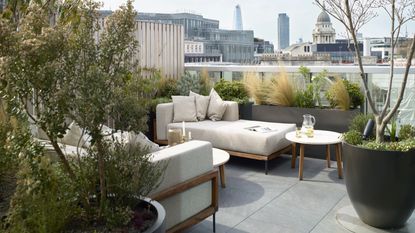

For anyone who lives in a busy, bustling city, urban gardening ideas will be on your radar as it can be a tricky challenge to get smaller outdoor spaces looking just right. Whether you have a tiny terrace, a courtyard encased by walls, a bijou balcony or a rooftop spot, even the smallest of outdoor spaces can provide a sanctuary to escape city life.
But when space is limited, it can be tricky to know how to make the most of it – what plants grow best in city gardens? What layouts will expand your space? How can you add that much-needed privacy? All of these small space hurdles can easily be overcome and there are plenty of garden ideas for urban locations that are equally as beautiful as their spacious country counterparts, it's just about being clever with the space you do have.
Urban gardening ideas to green your city garden
Not sure where to start when it comes to your urban garden? 'I would start collecting pots straight away, building up a gorgeous container garden bit by bit. They don't all have to be fancy and expensive, it is nice to combine different types and shapes.' suggests Kristina Hasan, also known as The Hackney Gardener.
1. Opt for hardscaping in an urban garden
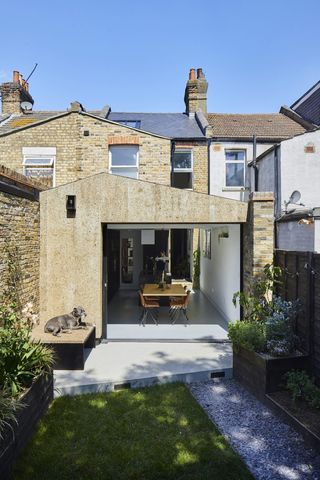
Embrace modernity in urban gardens by keeping a sense of formality. The clean lines, asymmetric layout and contrasting materials reflect the architecture of this extended Victorian terrace in London, making the garden feel almost like an extension of its design. There's still texture going on here with the beautiful, slightly wild raised beds, dark planters and there's even a lawn squeezed in too, so it doesn't feel unnatural, just a lovely balance between architecture and nature.
'A great budget tip is to build simple rectangular planters out of pallets - that's one good thing about living in the city, you can always pick up discarded pallets for free! ' says Kristina Hasan aka The Hackney Gardener.
'Paint them black or dark green for a sleek look and line them with empty compost bags to stop them from rotting and keep moisture in. With the planting, for instant impact, I would go for fast-growing annuals like nasturtiums and maybe Cobea Scandens climbing up a wigwam for some height. Then you can build up a collection of perennial plants over a few years, dividing them and taking cuttings to create new plants for free.'
2. Ditch the lawn in an urban garden
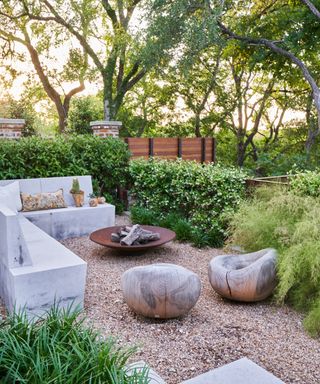
If a lawn isn't a top priority in your garden, then ditch it altogether. A small square patch of lawn floating in the center of a garden isn't going to add anything, so instead copy this gorgeous urban gardening idea and turn your space into a relaxed, informal space, with with plenty of greenery and at the center of it all the perfect spot for alfresco entertaining, complete with firepit idea.
'I tend to treat outside spaces like a room when it comes to styling. I really don’t understand why you wouldn’t style a table in the garden, for example, the same way as you would do in a room inside your house or apartment,' says Julia Thompson, interior designer and owner of Frank Interiors.
'The key is to group a few pieces together, usually of differing heights and shapes, to achieve the look that you desire,' she adds. 'I try to find quirky, vintage pieces and mix them with affordable high street buys. Yes, don’t put your best ceramic vases in the garden, that’s for sure! Depending on the garden, you can leave your decorative pieces out all year round. Of course, this isn’t possible on a roof terrace, as it can get quite blowy during the winter months, but for a normal, bog-standard garden, it shouldn’t be a problem at all.'
3. Plan your planting
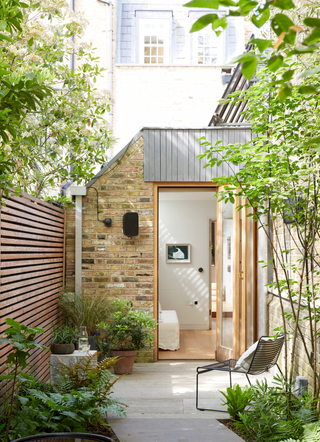
Speaking of exotic planting, this is one huge pros of urban gardening, you have the benefit of these spaces often being sheltered and relativity warm, so you can grow more exotic plants that would struggle in a larger country garden.
Another thing to consider when choosing plants for a modern garden is that urban gardens do tend to be surrounded by buildings, or to avoid being overlooked, tall fences. This does mean they can be quite shady spaces so opt for shade-loving plants and climbers like foxgloves, ferns and hostas.
Kristina Hasan says when it comes to choosing plants for a city garden it's 'totally down to personal preference but what I would say is you need lots of plants to make it feel like a garden. The more the better! You can keep it tight in terms of different varieties but try to fill the space with foliage, texture and color. Lots of city gardens I see are too bare - let the plants take over and surround you. That's how you get the feel of an urban oasis.'
4. No soil? No problem. Create raised beds
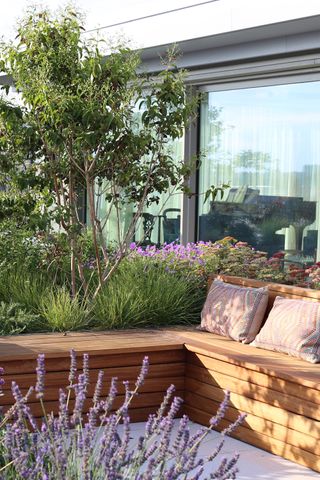
If you have inherited a city garden that is just a sea of paving slabs, the easiest way to turn it into a plant-filled oasis is by adding raised beds that you can fill up with compost rather than digging down to create flower beds.
The relaxed feel to the raised bed on this roof garden, works perfectly to add privacy with their layered plants and larger trees dispersed amongst the osmanthus, lavender and grasses – lots of inspiration to take from here. And why not build some seating into your planters too, saves on space and looks stylish.
5. Blur the boundaries between outside and in
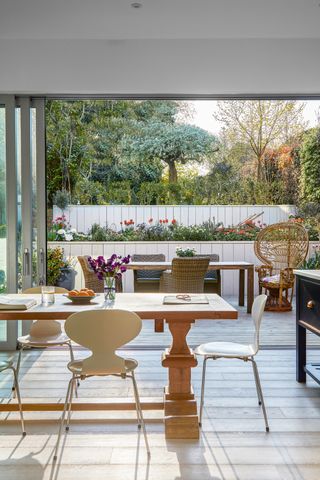
We all know that indoor/outdoor living spaces has been a huge garden trend in recent years, which is a bonus for urban gardens because you can essentially borrow space from indoors to allude to a more open feeling outdoor space.
The most straightforward way to create that seamless flow between indoor space and a garden is to pick the same flooring for both inside and out. Choosing a decking in the same tone of wood as the wood used inside your home, or patio tiles that match the indoor floor makes even the smallest of urban gardens look bigger as it just feels like an extension of the house.
When you are working with a roof terrace, the phrase ‘bringing the outside in’ could never been more relevant,' adds Julia Thompson. 'For me, as an interior designer, when thinking about how to design a small garden, it's often vital to carry the flow through from the inside the apartment to the terrace.'
Julia worked on one London roof terrace with views over the city. 'I worked with Barbara Samitier of Barbara Samitier Gardens who created the stunning garden design for the three roof terraces, which I furnished and styled to complement the interior of the apartment to really give it the ultimate indoor/outdoor feel,' she says.
Barbara designs the layout, the planters and the planting scheme, sources the plants, liaises with the structural engineer re the weight loading allowances and drainage of if working on a city roof terrace - two very important aspects when planning a roof terrace. 'We have used large planters in order to be able to grow large shrubs, hedges and trees, which means that they are very heavy when filled with soil. You need to check the weight of soil when wet and when planters are filled with water. Small pots would look twee and would dry out too quickly on a roof terrace,' says Barbara.
'Planting that does very well on a sunny roof terrace is Mediterranean planting such as Santolina, Rosemary, Thyme, Myrtus and Stachys Byzantina,' she adds. 'Most grasses will do well too. Griselinia and Portuguese laurel are great for evergreen hedges. And Trachelospermum jasminoides for their magical fragrance that smell of holidays in the Med. Cornus kousa and Osmanthus are great as small trees.'
6. Think big even in a small urban garden
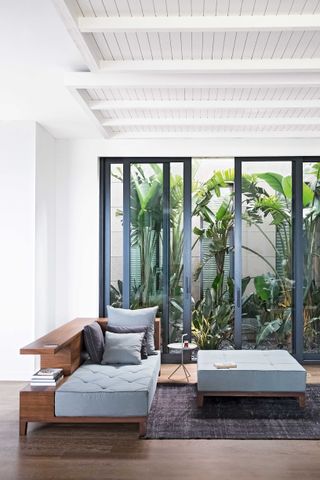
There's a tendency when planning a small urban garden to think small – small plants, small pots, small patio tiles, but scaling down on everything is only going to leave you with a cluttered, fussy space.
So instead go big, go oversized and create a garden that feels lush and full. Plus adding this depth with larger plants can make a small garden look bigger as they can blur the boundaries of your space. Case in point this fabulous courtyard garden that's filled with towering banana trees.
7. Switch flower beds for stylish containers
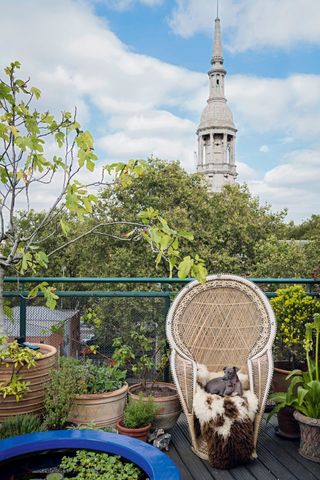
Containing gardening is another easy alternative to flower beds and can work so well on balconies or as a roof garden idea. Cluster different sized pots together to create almost the same effect as a flower bed, with plenty of different heights and textures going on to add lots of depth. On this thriving rooftop garden, you'll even find a pond in a pot, complete with goldfish!
'Pretty much anything can grow in containers - flowers, fruit and vegetables, climbers and roses.' explains Kristina Hasan. 'Trees and shrubs too, the pots stop them from growing too big which is useful in a small space. I love tulips and daffodils in pots and once they have finished flowering, I replace them with dahlias. My best tip is to buy a few big pots rather than lots of small ones. They are more expensive but give much more impact and don't dry out as quickly so the plants are happier in them.'
8. Add privacy with stylish fencing
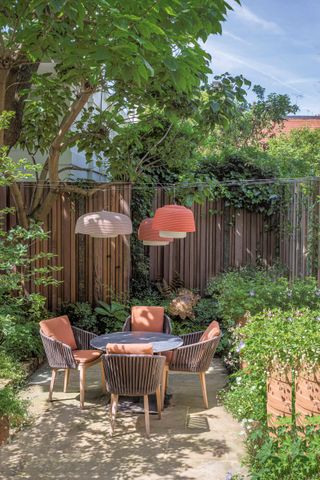
Privacy fence ideas are of course key in any urban garden that is overlooked. But they needn't be a purely practical feature, opt for a design that' going to add style to your garden as well as seclusion.
For a fence that really blends into the garden, pick a design that has natural shape to it. You don’t often find neat lines and equal measurements in nature, so for a fence that feels part of the garden keep your panels different sizes and overlap them to add texture. You can see in this fence, lengths of bark have been added too for an even more natural feel.
9. Embrace awkwardly shaped urban gardens
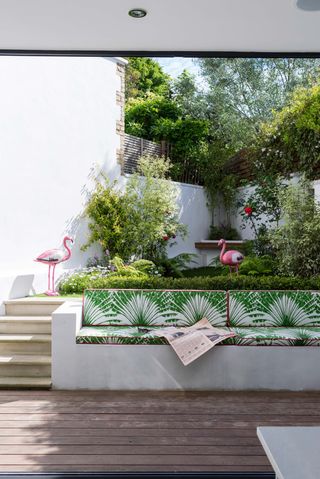
A quirk shall we call it, of urban gardens if that they often don't come in the form of neat squares. Many are narrow or penned in by adjacent boundary walls, or as is the case with this garden, triangular. But there are some really simple urban gardening ideas you can steal from this space to get your looking bigger and brighter, so you won't notice the slightly odd floor plan.
Easy start – paint your garden walls or fences in pale tones as we all know what space-expanding effects they have. Then train climbers up to soften the look and any awkward angles that might be going on. Adding levels to your garden, especially if it's narrow, will also distract from the shape, adding interest and depth.
10. Create zones to expand your space
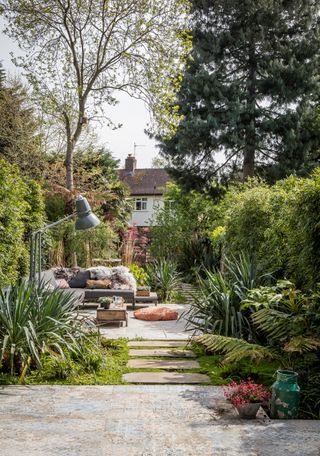
If space allows, breaking up your garden into 'rooms', adding intrigue and alluding that the garden goes on beyond the boundaries of what you can immediately see.
See how in this city garden the eye is drawn through zones – first the patio, then a small lawn, then an outdoor living space and then a strategically placed path weaves its way to the back of the garden, where a cleverly placed mirror only continues the illusion that the space goes on and on.
You can divide your garden using large plants and hedges as seen here, or for a more structured design choose trellis or fences that can protrude just slightly into the garden to act as walls.
11. Bring in plenty of different textures
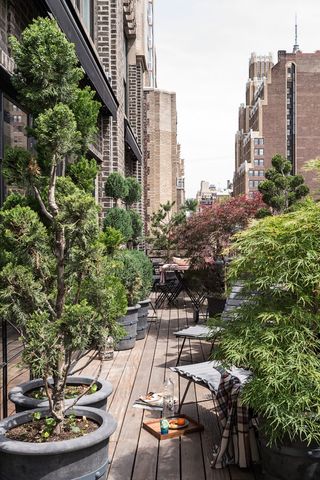
Texture, texture, texture, it's key in an urban garden even if you are going for a very minimalist look. It's texture that will add interest to your space can be used to blur the edges of your garden. Plants and trees are the obvious way to bring in lots of different textures, so when planning your planting be sure to pick an array of sizes and shapes. And go big too, choosing larger trees will also create privacy.
12. Think about color
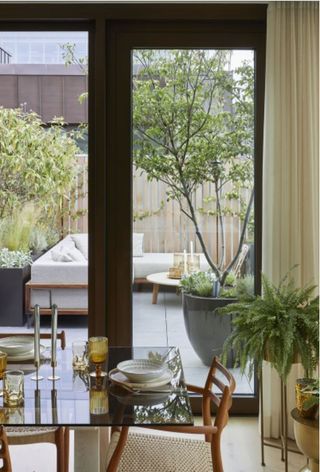
'Designing and planting a terrace garden idea isn’t just a case of buying a few pots and adding some pretty plants. Done properly, it is a far more complex process than designing even your average garden,' says Julia Thompson.
'That is why for one roof terrace I brought in talented garden designer Barbara Samitier, who I had worked with on a previous project and trusted to complete the look that I knew the homeowner would want. My brief to her was to continue the color palette that I had used in the house of bronzes and creams, rather than opting for the classic dark grey that is popular with gardener designers across the globe.'
13. Plant vertically
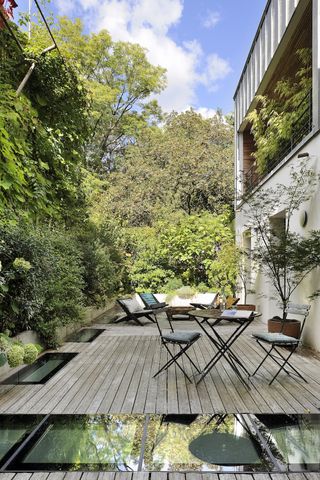
If your urban garden is really on the tiny side, avoid any solid walls or fences and this is just going to make the space feel claustrophobic. Cover the walls in greenery, whether that be beautiful climbers than billow messily over your fence or something more contained and contemporary like a living wall.
Plus, adding greenery on the walls rather than with flower beds will free up that precious floor space, giving your more space at ground level to add a lawn or look into stylish decking ideas.
14. Picking the right garden furniture
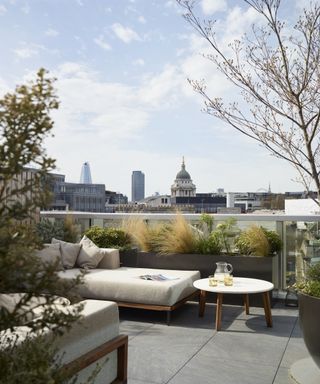
'The old adage ‘you get what you pay for’ is never more true than when it comes to buying garden furniture. Good quality, waterproof (rather than water resistant or rain resistant) sofas and chairs are expensive but, in my opinion, are worth every penny for small garden ideas,' says Julia Thompson. 'They can be left out all year (it is better to cover them during the winter months, particularly in the UK) but from spring to autumn, the cushions can be kept outside as they have be made using special waterproof fabric and cushions and come with guarantees.'
'Again, for me, the inside/outside flow is vital. A lot of garden furniture comes in dark colors, but I wanted to stick to the creams and browns that I had used in this house. I chose Talenti, an Italian company, who had the quality and the color palette I was looking for. I bought everything directly from Italy, but that was pre-Brexit! I wouldn’t advise that now - if you do, beware of hefty import taxes and duty!'
'I used very on-trend Travertine, a natural stone, inside this apartment and so I wanted to repeat that on the terrace,' she adds. 'Each one of the tables - coffee, side and dining - are made from this beautiful, creamy colored, limestone and have elegant wooden bases. Set against the dramatic dark green of the planting, the end result is stunning.'
15. Switch traditional garden furniture for a hammock
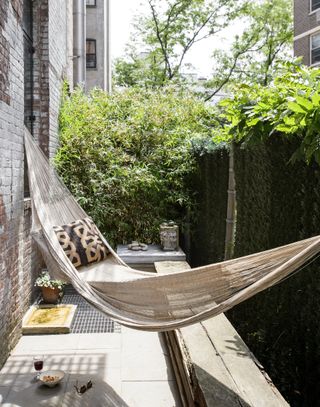
While hammocks may seem like something that should be reserved for vacations, not city gardens, they are in fact the perfect piece of garden furniture if you are tight on space. They take up zero floor space, don't add any visual bulk and can easily be stored away should you need the space for entertaining.
16. Style your space
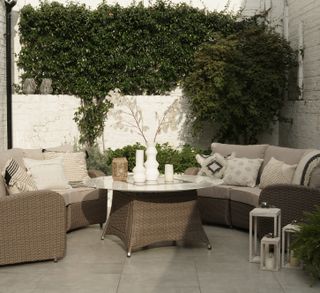
'If you live in an apartment with a small balcony or terrace, it's important to make the most out of your outdoor space. With smart furniture choices and tricks to set the mood, you can still make the most of your outside space and create your own little self-haven,' says Jonny Brierley, CEO at Moda Furnishings.
'When picking city garden decor, think soft and comfy. By using softer outdoor seating ideas, this will make your space feel larger while allowing you to use throws and cushions for ultimate comfort. Finally, set the mood with artificial lighting to create a warm and inviting space. Some string fairy lights never go amiss if you want to add a casual, fun feel to your outdoor decor.'
17. Trick the eye with outdoor mirrors
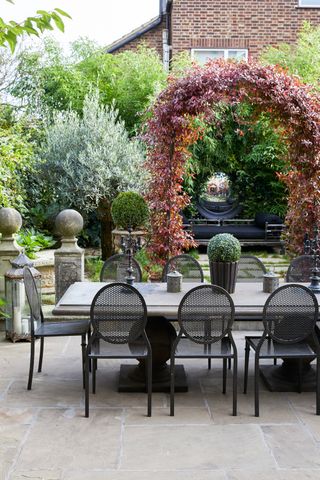
We all know the powers of a strategically placed mirror, and this old design trick can work just as well in urban gardens as indoors. Go oversized and mirror a whole wall of your patio to 'double' the space, or be more subtle by hiding mirrors in amongst your greenery.
18. Use tiles in an urban garden
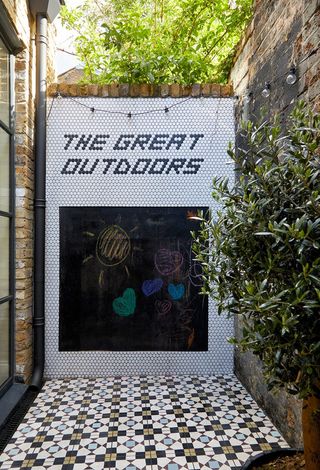
If you aren't the most green-fingered so want to keep your urban garden stylish and functional, tiles can be a fun way to make your space interesting without the need for lots of plants.
In this garden, imposing brick walls have been covered in lighter tiles, instantly making the space feel lighter, brighter and more creative. The patterned floor tiles have a similar space-enhancing effect, plus the casually strung-up festoon lights and olive tree add a Mediterranean vibe.
19. Make the most of a light well garden
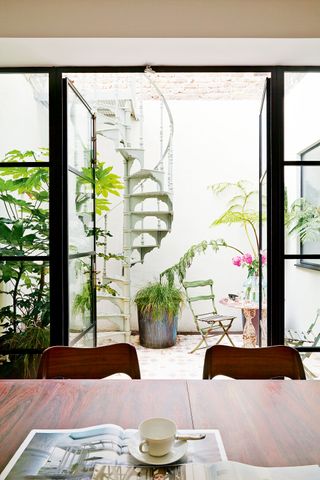
Sometimes with urban gardening, the only outdoor space you are blessed with is a light well or a tiny internal courtyard garden. But these small green spaces can still be beautiful and provide you with all you need from a garden. Take inspiration from this simple space – whitewashed walls and pale floor tiles turn it from what could be a dark and dingy space into an area you'd actually want to spend time on a Sunday morning with a cup of coffee.
Note the use of just a few large plants rather than lots of small pots, there's an elegance to the towering tree ferns and palms combined with the Victorian-style spiral staircase and vintage bistro set.
What can you plant in an urban garden?
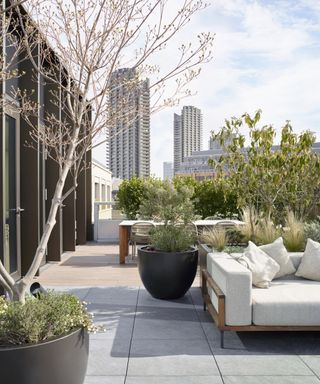
The best plants for urban gardens are ones that work hard, and by that, we mean that they look good for most of the year and aren't too fussy about light or soil quality. As a lot of urban gardens tend to be enclosed by have high walls or fences for privacy, they don't usually get tones of natural light so look out for shade-loving plants like ferns and hellebores for the ares of your garden that don't see much sunlight.
Climbers are also great for urban gardens as they can soften up those walls and fences, plus give you extra privacy. Try climbing roses and Jasmin for gorgeous blooms and delicious scents. Urban gardens can sometimes have warmer microclimates too, so you can grow more exotic, less hardy plants like ferns, palms and bamboo that are used to warmer climes.
And as we've said, don't just opt for small plants, small urban gardens can handle large plants and trees and choosing these over small fussy shrubs will make the space feel bigger as well as more exciting.
How can you add privacy to an urban garden?
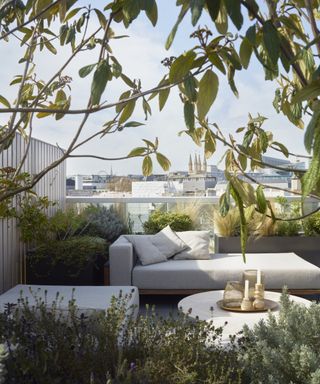
The best way to add privacy to a an urban garden is with fences. Even if you have to go tall with your design for maximum privacy, prevent fences from becoming too imposing by painting them either in a lighter shade (or opting for a light wood) or go the opposite way with a dark shade which you can then disguise with plenty of lush greenery and climbing plants.
Trees are also a more natural way to add privacy, so try planting them around the perimeter of your garden.
'Pleached trees are so great for this, they create a sheer screen with their foliage but still let light and air through. Trees in general add privacy, even a small potted fig or olive next to a seating area makes it feel more secluded. They also provide some shade which is much needed in summertime as small gardens are often very sheltered sun traps and can get super hot!' says Kristina.
Be The First To Know
The Livingetc newsletter is your shortcut to the now and the next in home design. Subscribe today to receive a stunning free 200-page book of the best homes from around the world.
Hebe is the Digital Editor of Livingetc; she has a background in lifestyle and interior journalism and a passion for renovating small spaces. You'll usually find her attempting DIY, whether it's spray painting her whole kitchen, don't try that at home, or ever changing the wallpaper in her hallway. Livingetc has been such a huge inspiration and has influenced Hebe's style since she moved into her first rental and finally had a small amount of control over the decor and now loves being able to help others make decisions when decorating their own homes. Last year she moved from renting to owning her first teeny tiny Edwardian flat in London with her whippet Willow (who yes she chose to match her interiors...) and is already on the lookout for her next project.
-
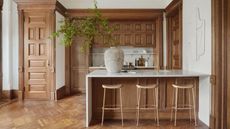 These Are the 6 Types of Kitchen Layouts You Need to Know
These Are the 6 Types of Kitchen Layouts You Need to KnowNo matter the age, style, or architecture of the home, there’s a kitchen layout design that will benefit you the most — you just need to explore the options
By Portia Carroll Published
-
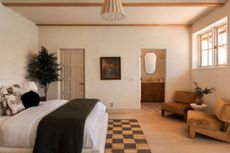 5 Laundry Lessons I've Learned That Stopped Me From Ruining My Bed Linen Forever
5 Laundry Lessons I've Learned That Stopped Me From Ruining My Bed Linen ForeverTake note of these tips to keep your bed sheets looking as good as new
By Ciéra Cree Published